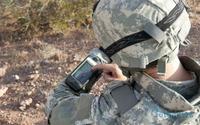-
Using DNA to track down criminals and fight counterfeiting
Applied DNA Sciences, based in Stony Brook, New York, works with banks, governments, and businesses across the globe to detect and prevent fraud in areas that range from textile fibers, casino chips, and cash; Applied DNA has worked with authorities in the United Kingdom to insert DNA markers in currency to help track down money stolen from bank heists and other robberies; the company has helped solve thirty-five cases; the company also embeds plant DNA in casino chips to fight fraud and counterfeiters by making unique markers that are impossible to duplicate; its technology can also be used in virtually anything to fight counterfeiters or authenticate products
-
-
Smartphones makes military networks vulnerable

The U.S. military has increasingly integrated smartphones into combat operations, but cyber security experts warn that these devices could also pose a major security challenge to military networks; smartphones are fast becoming the target of choice for hackers; Android phone applications have no security screening procedures before they are released, while iPhone apps are only loosely screened; to secure these devices, the military can encrypt all data, turn off voice capabilities, and lock the phone to only allow the use of approved apps; the Army is considering issuing every soldier a smartphone
-
-
Identifying the criminals among multiple DNA samples
Providing certainty without a reasonable doubt is not possible when the DNA at a crime scene comes from multiple sources; this happens in about one in ten cases, meaning that important evidence for putting a criminal behind bars is lost; a new technique takes the uncertainty out of DNA samples, when more than one person’s DNA fingerprint is in the mix
-
-
Studying counterterrorism in Israel upsets Cambridge residents

Some residents of Cambridge, Massachusetts are upset that sixteen law enforcement and emergency services officials from the city went to Israel in an Anti Defamation League-sponsored trip to observe Israeli counterterrorism methods; the trip was funded by a local businessman; in a city hall meeting residents expressed discomfort with a privately organized trip for public officials — and with the fact that these officials chose Israel as the place to study counterterrorism tactics; one local resident said that what Israel calls “counterterrorism” is “a mechanism of oppression suited to employment in a police state, a status I do not regard our city as having obtained. At least not yet”
-
-
A new threat: organized crime, terrorists links
Lawmakers and security analysts around the world are growing increasingly worried about links between terrorists and organized crime; terrorists and organized crime gangs have increasingly worked together around the world to finance operations; in 2000, it was estimated that FARC, Colombia’s largest terrorist organization, received as much as $400 million annually from its role in the drug trade; intelligence reports found that al Qaeda was looking to work with Mexican cartels to sneak into the United States; Islamic extremists have also become organized criminal networks themselves engaging in kidnapping, human trafficking, counterfeiting money, fraud, and armed robbery to raise money for their causes
-
-
Vallon showcases innovative mine detector
German company Vallon unveiled its latest mine detection system; one of its advantages is that it can detect mines made with no metal parts (the device can detect metal-free particles at a depth of 40 cm, and metal objects at greater depths); the UN is already deploying the device in mine-clearance operations in thirty countries
-
-
Army water contracts fraudster appeals
Last Tuesday, a man convicted of defrauding the U.S military of millions of dollars on water purification contracts requested the Eleventh Circuit Court of Appeals to throw out his 210-month sentence because a key witness was unable to testify; Richard E. Long was convicted of bribery, wire fraud, and money laundering for WATEC, Inc., a Tennessee based firm that provides water purification services to the military; Long accepted $550,000 in bribes in exchange for rewarding contracts worth as much as $66 million to WATEC, Inc.
-
-
Effort to stem flow of firearms to Mexico backfires

There are no limits in the United States to the number of long guns (as opposed to pistols or revolvers) a person is allowed to buy; the Mexican drug cartels exploited this buy sending thousands of straw buyers to gun shows an gun shops to buy hundreds of thousands of fire arms, then smuggle them to Mexico; to stem the flow of guns, the ATF launched Project Gunrunner: rather than just take down low-level straw buyers here and there, the agency hoped that by “letting the guns walk,” the sales would lead investigators to cartel members higher up in the organization; insiders say it never did; ATF could have told gun owners not to sell, or later seize the guns in an arrest; instead, gun store owners were allowed to sell even though agents often knew the buyer was a straw for the Mexican cartels; those guns can be traced to hundreds of robberies, rapes, and murders; experts said the numbers are much higher
-
-
Explosive-detecting rats to save soldiers' lives

An Oklahoma State University researcher received a $740,000 grant from the Department of Defense to conduct the research into using rats as landmine sniffers; rats have three advantages as bomb sniffers: the rodents, about the size of a small cat, can cover a lot of ground quickly; their acute sense of smell enables them to sniff out land mines, but they are small enough that they do not detonate the mines; also, they do not form attachments to their handlers so anyone could deploy them
-
-
Pentagon testing "Taser grenades"
The Pentagon recently placed an order for a test batch of “Taser grenades,” a long-range electroshock projectile; the grenades, designed by Taser International under a $2.5 million contract, are a forty-millimeter Human Electro-Muscular Incapacitation (HEMI) projectile that is intended to stick to a target and deliver a series of intense electric shocks, leaving them incapacitated; if tests are successful, HEMI could be ordered for rapid deployment to Afghanistan
-
-
Force Protection Equipment Consortium to meet in mid-May
Held every two years since 1997, the collaborative effort between government and more than 575 exhibitors from U.S. and allied industries known as the Force Protection Equipment Demonstration will feature more than 3,000 commercial off-the-shelf items of equipment and systems for countering terrorism
-
-
Sector Report for Tuesday, 8 March 2011: Law Enforcement Technology
This report contains the following stories.
Plus 2 additional stories
-
-
New study aims to find why body armor fails
A new study is currently underway to discover the best materials to use in the construction of body armor and to understand why body armor can at times fail; working in conjunction with the Police Executive Research Forum (PERF), Baltimore based H.P. White Laboratory is researching which materials can best stand up to the rigors of real-world physical and environmental impacts and still maintain their efficacy throughout a body armor’s lifespan
-
-
Police turning to Facebook to fight crime

Local police departments across the United States have are beginning to use Facebook and Twitter to communicate with local residents and track down criminals and missing persons; departments have successfully apprehended suspects minutes after posting photos online; police have also received tips on the whereabouts of wanted criminals and Facebook has become a part of the investigative process; Facebook’s traditional functions of outreach and communication have helped departments keep residents informed and build trust; critics of police patrolling Facebook and Twitter for tips say that it is an invasion of privacy; police have been careful to only use publicly posted information that users choose to display
-
-
Wisconsin introduces law to ban fake caller IDs

Republican legislators in Wisconsin have introduced a bill that would make it illegal to use a fake caller ID number to “defraud, cause harm, or gain anything of value”; last year Congress passed a similar bill that banned the use of “phone spoofing” technologies — technology that allow an individual to choose what number they wish to appear on another person’s caller ID; the new bill would allow law enforcement officials to target individuals making prank calls in addition to prosecuting companies that provide spoofing technology; critics question the timing of the bill as it comes after a high-profile prank call to Wisconsin governor Scott Walker
-
More headlines
The long view
Why Was Pacific Northwest Home to So Many Serial Killers?
Ted Bundy, Gary Ridgway, George Russell, Israel Keyes, and Robert Lee Yates were serial killers who grew up in the Pacific Northwest in the shadow of smelters which spewed plumes of lead, arsenic, and cadmium into the air. As a young man, Charles Manson spent ten years at a nearby prison, where lead has seeped into the soil. The idea of a correlation between early exposure to lead and higher crime rates is not new. Fraser doesn’t explicitly support the lead-crime hypothesis, but in a nimble, haunting narrative, she argues that the connections between an unfettered pollution and violent crime warrant scrutiny.
Bookshelf: Smartphones Shape War in Hyperconnected World
The smartphone is helping to shape the conduct and representation of contemporary war. A new book argues that as an operative device, the smartphone is now “being used as a central weapon of war.”
